The Perfect Game
 for some thematic elements.
for some thematic elements.
Reviewed by: Scott Brennan
CONTRIBUTOR
| Moral Rating: | Better than Average |
| Moviemaking Quality: |
|
| Primary Audience: | Kids Family Teens Adults |
| Genre: | Family Sports Drama |
| Length: | 1 hr. 53 min. |
| Year of Release: | 2010 |
| USA Release: |
April 16, 2010 (wide—417 theaters) DVD: August 2, 2011 |
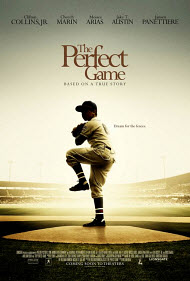
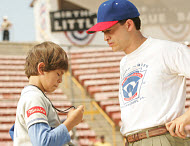
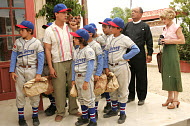
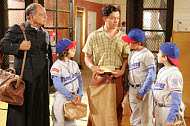
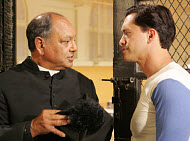
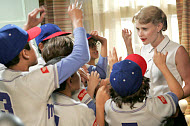
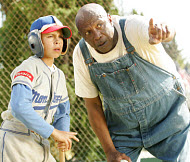
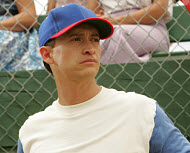
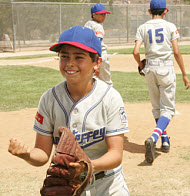
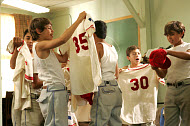
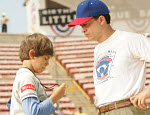
POVERTY—What does the Bible say about the poor? Answer
What are the consequences of racial prejudice and false beliefs about the origin of races? Answer
A single man or woman can help change the world. Read about some who did with faith and God's help…
Jesus Christ, Noah, Abraham, Joseph, Moses, and David
Lying in the Bible
| Featuring |
|---|
| Clifton Collins Jr. (Cesar), Cheech Marin (Padre Estaban), Moises Arias (Mario)—“Hannah Montana”, Jake T. Austin (Angel Macias)—“Wizards of Waverly Place”, Gabriel Morales (Ricardo Trevino), Ryan Ochoa (Norberto)—“iCarly”, Carlos Padilla (Baltazar), Jansen Panettiere (Enrique)—“The X’s”, Mario Quinonez Jr. (Gerado), Anthony Quinonez (Fidel), Alfredo Rodríguez (Pepe), Carlos Gómez (Umberto Macias), Emilie de Ravin (Frankie), Patricia Manterola (Maria), John Cothran Jr. (Clarence), Louis Gossett Jr. (Cool Papa Bell), Frances Fisher (Betty), William May (Juan), See all » |
| Director |
|
William Dear “Free Style,” “Wild America,” “Angels in the Outfield,” “Harry and the Hendersons” |
| Producer |
| Daniel de Liege, Michael O. Gallant, Chris Howard, Rudy Joffroy, Blake Koch, Mark W. Koch, Terence Richards, Peter Roach, David Salzberg, Christian Tureaud, W. William Winokur |
| Distributor |
| IndustryWorks Pictures |
“Dream for the fences”
It was 1957, the year that “Leave it to Beaver” made its debut on CBS, the U.S.S.R. (Russia) launched the Sputnik I—the first artificial Earth satellite, “West Side Story” opened on Broadway, and President Eisenhower introduced the Civil Rights Act. But, if you are like me, you may not have heard about an extraordinary group of boys from Monterrey, Mexico, who traveled to the U.S. and shocked the world by winning 13 games in a row—making it into the Little League World Series in Williamsport, PA for the final championship game in that same year. I certainly hadn’t, and I had played little league baseball for many years in my youth.
As to the title of the film, “The Perfect Game”, written by W. William Winoker, it’s referring to the technical definition of the game with “no hits,” “no runs,” and “nobody gets on base” from the opposing team. That means 18 batters up and 18 down—in 6 innings. (Little League rules designate just 6 innings.) There has only been one “perfect game” that has ever been played in the Little League World Series—but you’ll have to go watch the film to see if this was the one.
What I can tell you is that this was truly a stirring and encouraging film—one that just about the whole family can enjoy together. It’s reminiscent of “Rudy,” “Hoosiers,” and other sports-themed films, inspiring people, young and old alike, to take hold of their dreams and not let go. But what is really great about this story is the fact that it really happened. If it’s any indication, the audience applauded openly at the end of this movie (a rarity where I watch films), and there were quite a few sniffles and moist eyes in the hallway on the way out of the theater.
The film opens with a Cesar Faz (Clifton Collins Jr.) arguing over his job as a “towel guy” (not the coach he pretended to be later) for the St. Louis Cardinals, and finally quitting and moving back to Monterrey, Mexico, burying his dream of coaching American baseball. As fate would have it, the local iron mill in Monterrey, where he took a job upon his return, along with his attempt to drown his resentments “in a bottle”—weren’t enough to keep his love for baseball buried for long. Who knew that Padre Estaban (Cheech Marin) of the local parish would be praying about something to keep the young altar boys of his flock occupied—something like baseball, and that the coach had just come to town? God did. And that’s how the story begins, with the words of Padre Estaban spoken almost prophetically to Angel Macias (well played by Jake T. Austin), “with God, anything is possible.” He was right, and Angel’s baseball dreams were on their way to fruition in a grand fashion—partly due to the faith and prayers of some young believers like himself.
Faster than you can say “Jackie Robinson,” Cesar Faz was able to transform this group of rag-tag boys in the church and community into a well-designed team, despite all the odds against it. He taught them some strong lessons about being team players. saying things like, “There are two kinds of players—those who are on a team and those who are not! You all rise and fall together!” And he reinforced good team sportsmanship with lots of hard work and practice, along with lessons about life. If it all sounds very predictable, it was, contrived in every way, playing on the emotions of the audience at every turn, yet for good reason.
It’s this backdrop that leads to the second half of the film, showing how this group of boys, all small in size compared to their American counterparts, would soon become known around the world as “los pequeños gigantes,” –the little giants. Director William Dear (“Angels in the Outfield”) does quite a fine job of intertwining pieces of actual historical footage and montages throughout the film—moving it along with realism and keeping it at a lively pace, with a great musical soundtrack.
One of my favorite scenes is when the boys refuse to go on the field without a man of God reading Psalm 108 to them before the game. Their priest had to go back to Mexico due to a visa issue, so they ended up with a black southern preacher (John Cothran Jr.) who did the reading for them. Although it may have had a little superstition to it (there are 108 stitches on the baseball), “the Word” was again moved to preeminence in the film. The scene ends with the preacher saying, “Now that’s what I call a dedicated flock.”
In spite of the generic Spanish accents and a few historical inaccuracies (like Monterrey being portrayed as a dirt town in the 1950’s), the cast of boys is enjoyable, although probably only recognizable to kids under 20, since many of them are from the “Hannah Montana” or “Wizards of Waverly” sets. [Fun factoid: The boy who played Enrique (Jansen Panettiere) had an almost identical scene in “The Secrets of Jonathan Sperry,” where he had to approach a girl he had a crush on and had to try and talk with her—a great scene in both films.] The female reporter, Frankie, (Emilie de Ravin—Claire Littleton from ABC’s “Lost”), aptly portrayed her role and represented a sort of “audience-bird’s-eye-perspective” with her character—in addition to a sub-plot of “women in journalism” thrown in for good measure.
Areas of Concern
Even with the family friendliness of the film, there are a few moral issues tucked in the background, some of which are reconciled and some of which are not. The fact that Coach Faz lies to the boys about his position on the St. Louis Cardinals is problematic (especially as a major plot point), ***SPOILER ALERT*** but is, thankfully, confessed to them in the end, although it could have been sooner. His drinking early on in the film, followed by a relapse one night when they are in the U.S. (which nearly gets them all deported) is troubling, but, at least, it adds some much needed angst to offset the sugary-sweet nature of this “Walt-Disney-like-feeling-1960’s-movie-tone” which, by this point in the film, began to take its toll on this adult viewer.
***END SPOILER***
There is a refreshing absence of profanity or sexual situations—although the supposed expertise of one of the young boys on the team on how to “win the heart of a lady” is a little odd, despite its mostly innocent portrayal by Mario (Moises Arias). It feeds into a sub-plot of a romantic interest between young Maria at church and the Coach. In one scene, Mario presents Maria with flowers (in front of the coach), and tells her it’s his fault they are dried up and not delivered to her, because he forgot to put them in water. The coach winks at the lie by his silence, and it is never cleared up in the plot. Angel’s character also speaks in rebellion toward his father (who is brooding and mean, in the beginning—with anger issues of his own), but it definitely isn’t a careful following of Exodus 20:12 “Honor your father and your mother, so that your days may be long in the land that the Lord your God is giving you.” There is also a scene where the boys raid a public fountain for coins (stealing) late at night, in order to send a telegram on behalf of the coach—without his knowledge—but the money is put back by Frankie, which clears that up, sort of.
Finally, I think the only reason this film received a PG-rating was due to the thematic elements: mainly the racial prejudice the boys are exposed to in the segregated South on their first visit to America. (However it should be noted that the poor Mexican boys of Monterrey had already experienced some level of prejudice toward them by the wealthier Spanish ruling class of Mexico City—which is, also, intimated in the story.) While I believe that the director handles the material in a positive way, the overall stereotypes and clichés may be offensive to some viewers on both sides. It is endearing to see the Mexican boys support the young black boy in the film, and upsetting to see the stereotyped white racism by the American teams and coaches, which, of course, are not true all of the time, or even most of the time. But those labels are not a good enough reason to miss this movie, especially as the team progresses toward the championship and receives a lot of support from Americans that do care and are cheering them on to victory.
Final thoughts and summary
Even though “The Perfect Game” is not the perfect movie, it is definitely chocked full of life-affirming messages, however contrived they may have been. Sure, in the perfect world I would have preferred a grittier, more historical piece that was completely in Spanish with English subtitles, and one that would have provided more danger, toil, and snares along the way. But what is offered instead is this heart-tugging, emotional film, that you just know is trying to get the best of you, but you can’t stop it no matter how hard you try. That “uplifting feeling” that everyone experiences in the audience at the end of this film—with the swelling music in the background—won’t just fall on viewers who happen to like baseball or who are part of the nearly 3 million Little League players in this country today. It comes down on everyone, and with a torrent of joy—the kind that gets down in the marrow of your bones. The ending will make you sit through all the credits, which includes a series of incredible not-to-be-missed photographs of the actual boys from Monterrey, including shots with President Eisenhower, the Brooklyn Dodgers, Macy’s in NYC and many more.
It’s a true story that deserves to be told, and now deserves to be seen, about kids and adults with a dream—even the American dream—and how lots of hard work, faith, and prayer can put you on a collision course with success. It’s a familiar path, often expressed in the human condition: where the “underdog” gains momentum and is ultimately supported by fans along the way—that consistently encourage them to reach for victory in spite of all the obstacles that may lie ahead. “The Perfect Game” has become—for this viewer—to quote a line from the movie—“The unexpected play, at the unexpected time.”
Violence: Minor / Profanity: None / Sex/Nudity: None
See list of Relevant Issues—questions-and-answers.


The film is, unfortunately, filled with lies and half truths. The coach did not have a drinking problem. The team received help from American teams, and not all white American ball players and fans were racist-majority were not, including our town of Fairfield, where I lived and played. The pitcher was the superstar, with his ability to pitch left and right handed, and the perfect game he threw. This amazed all little league players throughout the country. The team went to New York and then Washington to meet the President.
A country of racists would not have acted that way-the wealthy and middle class in Mexico did little to help the team. The first time I was in Monterrey was in 1971-it is a large industrial city—I did like the positive reference to the Catholic church in the movie-I am not Catholic.
Moral rating: Offensive / Moviemaking quality: 2
Moral rating: Excellent! / Moviemaking quality: 5


My Ratings: Moral rating: Good / Moviemaking quality: 4½